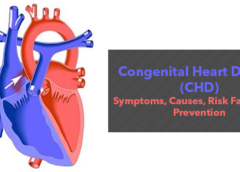What Is Congenital Heart Disease?
Congenital heart disease, or congenital heart defect, is a heart abnormality that occurs at birth. The problem can affect:
- The Heart Walls
- The Heart Valves
- The Blood Vessels
There are numerous types of congenital heart defects. They can range from simple conditions that do not cause symptoms, to complex problems that cause severe symptoms that threaten life.
According to the Centers for Disease Control and Prevention currently, there are 1 million adults and 1 million children living with congenital heart defects in the United States. Over the last few decades, treatments and follow-up care for defects have improved drastically, so that almost all children with heart defects survive into adulthood. Some need continuous care for their lifelong heart defects. Yet despite their condition, many continue to have active and productive lives.
Symptoms
A person with cyanotic heart disease may have:
- Difficulty breathing
- Chest pain
- A blue tinge to the lips, fingers, and toes, known as cyanosis
- Infants with delayed development, trouble feeding and low appetite
- A low concentration of oxygen in the body, leading to hyperventilation
- Sweating, especially while feeding
- Fainting
- A small size or low body weight
A person with acyanotic heart disease may experience:
- Feeling out of breath, especially during exercise
- Chest pain
- A slow growth rate and a low body weight
- Extreme tiredness
- Difficulty feeding and poor appetite in infants
- Sweating, especially when feeding
At the time of birth, there may be no signs, but problems can occur as a child grows older, and these can require care.
When to see a doctor
If you have alarming signs, including chest pain or shortness of breath, seek emergency medical treatment.
If you have signs or symptoms of congenital heart disease or have been treated as a child for a congenital heart defect, see your doctor.
Causes
Doctors don’t always know why a child suffers from a congenital heart defect. They tend to run in families.
Things that make them more likely include:
- Infant genes or chromosomal problems, such as Down syndrome
- Taking certain medicines, or drug abuse or alcohol during pregnancy
- A viral infection, like rubella (German measles) in the mother in the first trimester of pregnancy
Risk factors
A CHD usually results from a problem during the early stages of development.
There is a greater chance of a mother is already pregnant:
- Has rubella or German measles
- Has poorly controlled diabetes, including gestational diabetes
- Takes certain medications, such as isotretinoin
- Consumes large amounts of alcohol
Genetic factors may play a role. People with certain genetic conditions have a higher risk of CHD. There is an additional genetic disorder in at least 15 per cent of people with CHD. CHD may run in families.
Complications
Doctors can correct many congenital heart defects and treat CHD effectively, but complications are possible. These include:
- Endocarditis, a severe heart defect or valve infection
- Congestive heart failure, an inability of the heart to pump sufficient blood to the body
- Developmental delays in children due to lack of freshly oxygenated blood to the brain
- Respiratory infections including pneumonia
- Pulmonary hypertension, which is high blood pressure in the arteries between the heart and lungs
- Arrhythmia, which is an irregular heartbeat
- Sudden cardiac death, a rare CHD complication in which the heart abruptly stops
Regular medical care and checkups with a cardiologist (or pediatric cardiologist) who has experience treating heart defects are the best way to reduce the risk of CHD complications.
How Can Congenital Heart Disease Be Prevented?
Women who are pregnant or are planning to become pregnant may take certain precautions to reduce their risk of giving birth to a congenital heart defect:
- If you plan to become pregnant, talk with your doctor about any prescription or over-the-counter medicines that you are taking.
- If you have diabetes, be sure to check your blood sugar levels before getting pregnant. Working with your doctor to manage the illness while you are pregnant is also important.
- If you have not been vaccinated with rubella, or German measles, reduce disease contact and speak to your doctor about prevention methods.
- Consult your doctor about genetic screening if you have a family history of congenital heart defects. Certain genes may contribute to developing an abnormal heart.
- Avoid drinking alcohol during pregnancy and taking illegal drugs.

Leave a Reply
You must be logged in to post a comment.